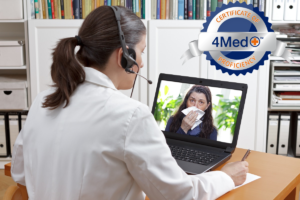As states and cities begin to re-open throughout the United States, contact tracing will become one of the most important public health measures in the fight against the novel coronavirus (COVID-19) and likely in public health history. Contact tracing involves the act of tracking new cases through a centralized system utilizing trained public health professionals in order to find new, COVID positive patients that are at increased risk of infecting others. Contact tracing is multifaceted and has the potential for slowing the rate of new incident cases as well as “flattening the curve”, which will be vital to curbing the inevitable rebound in COVID cases from the relaxation of social distancing measures. This will be critical while we pursue a potential vaccine and work to reopen the economy.
 While we do not yet have all of the scientific information we need regarding COVID incubation or contagion, we need to be proactive in identifying those at risk of possible infection. Contact tracers will reach out to those with positive testing to identify any associated contacts who may have been exposed during potential contagious periods. The contact tracer will then reach out to those contacts while maintaining the privacy of those infected. Basic education regarding COVID is given to all contacts and they are encouraged to self-isolate at home for the next 14 days while checking their temperature daily and evaluating for possible signs or symptoms of infection.
While we do not yet have all of the scientific information we need regarding COVID incubation or contagion, we need to be proactive in identifying those at risk of possible infection. Contact tracers will reach out to those with positive testing to identify any associated contacts who may have been exposed during potential contagious periods. The contact tracer will then reach out to those contacts while maintaining the privacy of those infected. Basic education regarding COVID is given to all contacts and they are encouraged to self-isolate at home for the next 14 days while checking their temperature daily and evaluating for possible signs or symptoms of infection.
The contact tracer will not necessarily be on the frontlines of the fight against the coronavirus; however, their job will be just as important as the economic recovery begins to alter social distancing practices. The contact tracer has the ability to drastically alter the course of the virus trajectory by breaking the chain of infection by isolating those at risk of infection due to prior exposure. A contact tracer will need interpersonal skills to connect with and gain the trust of the patient to ascertain the required information of who they have come in contact with, in order to stop the spread of the virus before it can occur. The contact tracer will act like a detective in helping the patient to remember details surrounding who may they have come in contact with. Contact tracers will also be utilizing the technological resources available through their employing agency to manage data and case management information. Finally, contact tracers will need to have the knowledge to answer the questions.
Tracing the contacts of actively infected patients will prove to be essential and we will need to rapidly hire and train enough contact tracers to act on all new COVID cases and speak with their known contacts. There will likely be a very large number of tracers required to meet demand while we attempt to jumpstart the economy in a safe manner. Contact your state or local department of public health for more information regarding contact tracing services and job openings. Salary ranges are reported to be between $40k and $70k (depending upon region and experience) with both short-term and long-term opportunities opening up everywhere. Public health officials say contact tracing allows for a slowdown of the virus without having to implement long-term mass stay-at-home orders, as infections in the U.S. register in the millions.
4MedPlus has developed a truly comprehensive entry-level contact tracing certificate program. It includes interview skill building and online digital form completion modules and covers all recommended guidelines for contact tracing education. It is also the only nationally accredited online training program that includes a valid certificate of proficiency, a professional badge/seal and optional national CE credit for nursing professionals.
For more detail regarding the 4MedPlus course, go to: https://www.4medtrainingcatalog.com/online-store/SELF-PACED-Certificate-of-Contact-Tracing-Skills-Proficiency-CCTP-p203672427

